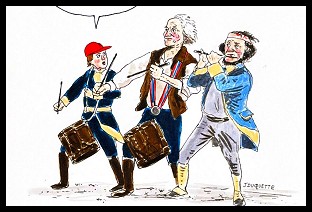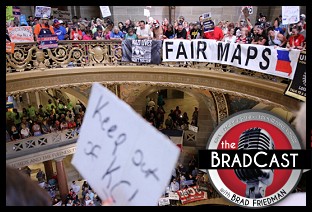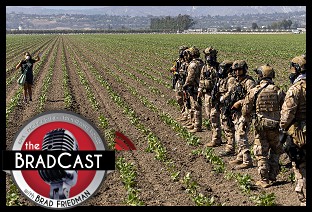READER COMMENTS ON
"CNN's Lou Dobbs: Johns-Hopkins University's Avi Rubin On E-Voting"
(20 Responses so far...)
COMMENT #1 [Permalink]
...
Grizzly Bear Dancer
said on 8/21/2006 @ 7:27 pm PT...
Thank you John for this thread. i believe it was Maryland where the governor and the state House of representives appropriated money to allow for a paper ballot trail for their e voting machines until some NEO-CON beoch tied in with DIEBOLD took matters in her own hands. She then went on to explain some BUSHIT excuse to the people living in the FASCIST commonwealth why their sellout state senate killed a safeguard which could evidence who won an election with more certainty than a system based on FAITH.
Diebold hackable voting machines, in which 1 person can steal an election undetected, is a company run by convicted felons. On the home front, this is Bushit administration DEMOCRACY at it's finest. Americans can expect to get bend over and raped by these criminal lying murdererous neo-cons perpetuating their power at the polls in every state election without a verifiable paper trail. This gives NEO-CONS the total control they planned to achieve when they sold these machines to U.S. taxpayers as part of their agenda.
COMMENT #2 [Permalink]
...
raoulhubris
said on 8/21/2006 @ 8:26 pm PT...
Am new to Bradblog. Just wondering if there are any organized efforts afoot to encourage absentee voting in areas using the paperless machines. I live in Leon County Florida, home of Ion Sancho a thorn in Diebold's side. We use optical scanners but the state and Diebold tried to strong arm Sancho when he sought independent testing of machines for handicapped voters. Where the law is not prohibitive it would seem absentee voting could have the supervisors of elections rethinking cost benefits if large nos. of voters requested the paper recorded absentee ballots.
COMMENT #3 [Permalink]
...
Ginny
said on 8/22/2006 @ 4:21 am PT...
Go here http://www.electiondefenseaction.org
and here http://www.electiondefensealliance.org
...to get active
We need coordinators across the country. Just voting or GOTVing (whether absentee or not) or getting others to do it is not enough.
We need to insist that the votes are counted in the open or declare no confidence. So unfortunately there is a lot more work to do than just voting.
Thanks for coming to Bradblog and welcome! Don't mind this gloomy, unreadable dark green. It's a guy thing or whatever. (The Bradblog seriously needs a woman's touch!) But until then, just pretend you're visiting your brother's apartment at college.
COMMENT #4 [Permalink]
...
Joan
said on 8/22/2006 @ 6:58 am PT...
Hey. Some of us don't mind the color green.
COMMENT #5 [Permalink]
...
texaslady
said on 8/22/2006 @ 7:11 am PT...
Latest Zogby Poll shows 92% want a transparency vote !!! That is wonderful news that people are listening and will demand a change. I can't even imagine what the 6% who do not think we need transparency are thinking and of course the usual 2% who care less.
As an avid watcher of Lou Dobbs it is good to see almost daily reporting on the e-vote debacle. Of course trying to get lawmakers interested thats like talking to a two year old.
COMMENT #6 [Permalink]
...
Joan
said on 8/22/2006 @ 7:34 am PT...
I'm not familiar with Russel Shaw, but his recent piece, '"Ohio Was Stolen" Crowd, Pay Heed To Tom Hayden', which I stumbled upon at HuffingtonPost, is less than helpful.
He cites an admonition from Tom Hayden about the importance of the upcoming elections, which he interprets thusly:
"...What Tom is saying is, when you take your "fantasy-based," "Ohio was stolen" opinions to the public square, and demonize anyone who asks for confirmational clarity, you run the risk that millions of voters who we all need to come down on our side this time will tune you out. Why? Because, frankly, the most shrill of you who are absolutely convinced that Ohio was stolen sound like sore losers, pundits with agendas, wack jobs, or some sort of combination of all of the above..."
I get the impression that Mr. Shaw is unfamiliar with RFK Jr, Lou Dobbs, the Bradblog and many other relevant things.
link
COMMENT #7 [Permalink]
...
Pastor Willie Blount
said on 8/22/2006 @ 8:17 am PT...
{Ed Note: Comment removed. Disinformation.}
COMMENT #8 [Permalink]
...
onyx
said on 8/22/2006 @ 8:46 am PT...
Pastor Willie - what are you talking about? It's not clear, at least it doesn't make any sense to me. Are you saying that Clint Curtis should be barred from running because he wrote a program that could change votes? Pleeeeease? He wrote a sample program at the request Congressman Feeney. He is now running against Feeney because he discovered that the program may have been used fraudulently by Feeney and others. The program itself is not fraudulent - its use in an election is.
If you get confused over simple facts like that and many others related to Feeney then you should not be surprised that anyone with a scrap of intelligence will dismiss everything you say. That means most of us posting here at Bradblog.
COMMENT #9 [Permalink]
...
Pastor Willie Blount
said on 8/22/2006 @ 9:05 am PT...
{Ed Note: Comment removed. Disinformation.}
COMMENT #10 [Permalink]
...
Charlie L
said on 8/22/2006 @ 9:06 am PT...
Absentee ballots and provisional ballots are another tool of the Repuglican* thugs to steal elections. THEY NEVER GET COUNTED. They are simply REMOVED FROM THE SYSTEM. Yes, THEORETICALLY, if the total number of absentee ballots was greater than the total number of cast ballots, they MIGHT be counted, but don't bet on it.
We would need a candidate to actually DEMAND that the votes be counted; not a Kerry, not a Hackett, not a Busby, but a REAL candidate who cared more about the integrity of the election than their own personal political future and who was educated about the multiple mechanisms that the Repugnicans* use to subvert the electoral process.
The counting has been completed for 2006 and surprisingly, the Repuglicans have won many surprise "come from behind" victories to hold both houses of Congress. Now all that is left is for the American people to cast their ballots and then accept the results of the "amazingly trouble-free" election as reported by the corporate-controlled and Repuglican-spin-dominated mass media.
Or, as an alternative, people who see their local election decided other than the pre-election and exit polls indicate it should have been could choose to GO UKRAINIAN on their government and go to the streets and demand OPEN VOTING and OPEN COUNTING.
Charlie L
*P.S. I tried to stay above the fray of name-calling, but the President of the United States yesterday referred to the Democratic Party as the "Democrat Party" and that was the last straw. This is not a "slip of the tongue" but a well-documented strategy based on consumer research and designed to disparage the Party of Jefferson. Screw the Repuglicans --- they are Repugnant and as ugly as pugs.
COMMENT #11 [Permalink]
...
Laura
said on 8/22/2006 @ 9:34 am PT...
Hi Joan, Glad to see you back.
COMMENT #12 [Permalink]
...
leftisbest
said on 8/22/2006 @ 10:01 am PT...
Hey, how can we get the actual video clip and not just the written transcript?
Didn't we used to have the videos at one time?
COMMENT #13 [Permalink]
...
Nana
said on 8/22/2006 @ 10:28 am PT...
I'm on Medicare, and I can share some of my experiences regarding the Republican Medicare Prescription Plan. Not only, was this plan written to be complex and confusing, but a threat of a fine being deducted from our monthly income was was in place. We had to make these decisions in a limited time, a dead line set by the "plan" I was not given enough time to reshearch or understand what was happening and had to ask my doctor for advice. I made a costly mistake, one I couldn't afford, and chose a plan with no deductible, only to find that it did not cover all of my medication. So, I'm locked in to a "plan" for a year, where I pay monthly premiums, and the cost of some drugs. I can't afford it.Can someone tell me what the big hurry was?
COMMENT #14 [Permalink]
...
Robert Gehrke
said on 8/22/2006 @ 10:29 am PT...
{Ed Note: Comment removed. Disinformation.}
COMMENT #15 [Permalink]
...
Laura
said on 8/22/2006 @ 12:31 pm PT...
COMMENT #16 [Permalink]
...
Elizabeth
said on 8/22/2006 @ 12:35 pm PT...
I want to comment about "Mr. Fisher" and about absentee ballots. I have experience with both.
Last week I held a fundraiser for Clint Curtis. We (the organizers) received a mysterious phone call from a "Mr. Fisher." He believes AIPAC is behind the election fraud. However,what really made me question Mr. Fisher's wild information was that he believes that he should be Al Gore's running mate in 2008.
About absentee ballots, King County, WA, one of the country's most populated counties, is planning on moving to all mail voting. I am not in favor of this move. In 2005, 5% of the absentee ballots were not counted due to "unrecoverable error" which includes damaged ballots, and I think ballots with no signature and I am not sure what else. 5% is a lot of ballots. This number does not include votes that are not counted because of overvotes and undervotes. Absentee ballots identify precincts, and in states where a voter must identify him or herself as a Democrat, there is ample opportunity for such ballots to disappear prior to being counted. Absentee ballots are a good alternative to paperless touchscreen voting, or any touchsreen voting, but it is not a good alternative to poll site voting with reliable voting equipment.
Furthermore, all vote by mail or absentee voting on demand, eliminates one of the best checks and balances to stolen elections --- exit polling. If all vote by mail becomes the popular alternative to e-voting, or as an avoidance mechanism to complex procedures for poll site voting, we will be no better off.
COMMENT #17 [Permalink]
...
Charlie L
said on 8/22/2006 @ 1:32 pm PT...
Nana (#13): I am sorry for your plight. The reason the bill had to be rushed through in the middle of the night with kept-open-longer-than-normal voting, arm-twisting, threats, and perhaps even outright felonious bribery was that there were literally BILLIONS of dollars in giveaways to large pharmaceutical corporations built into the bill. Passage of this boondoggle and rip-off was a promise made by corrupt Republicans (and even a few DINOs) in return for massive campaign contributions.
To put it bluntly (but absolutely not personally) Nana: You've been had!
Oh, and a major player in the screwing of you and every other senior on the plan was an organization you may have heard of: AARP. They helped write the plan, they helped lobby for it, and they are going to make hundreds of millions off it. NOW, of course, as seniors like you are realizing how screwed you are, AARP is backing off and lying about their involvement.
You still a member of AARP? Quit now and tell all your senior friends to do the same. They are part of the problem, not part of the solution.
Charlie L
COMMENT #18 [Permalink]
...
Joan
said on 8/23/2006 @ 1:31 pm PT...
Hi, Laura. Nice to know someone noticed my absence! 
COMMENT #19 [Permalink]
...
Nana
said on 8/23/2006 @ 8:33 pm PT...
Thanks for the info Charlie L. I'll cancel the AARP right now, I wasn't aware of that, and will spread the word. As for being had, I kinda guessed that, and they would probably do it to their own mothers.Don't know how they sleep at night.
COMMENT #20 [Permalink]
...
Laura
said on 8/23/2006 @ 8:36 pm PT...
Joan, actually other people had noticed on previous threads. Now I'm just wondering if Dredd will be back. It got a little heated a few days back and I haven't seen him back on. Something about rules.
 Tonight, Dobbs reporter and stand-in Kitty Pilgrim interviews Professor Avi Rubin about his new book and about the dangers of Direct Recording Electronic voting machines.
Tonight, Dobbs reporter and stand-in Kitty Pilgrim interviews Professor Avi Rubin about his new book and about the dangers of Direct Recording Electronic voting machines. 


 A Pretty Weak 'Strongman': 'BradCast' 10/30/25
A Pretty Weak 'Strongman': 'BradCast' 10/30/25 'Green News Report' 10/30/25
'Green News Report' 10/30/25
 Proposal for 'First Politically Viable Wealth Tax' Takes Shape in CA: 'BradCast' 10/29/25
Proposal for 'First Politically Viable Wealth Tax' Takes Shape in CA: 'BradCast' 10/29/25 Monster Storm, Endless Wars, Gamed Elections:
Monster Storm, Endless Wars, Gamed Elections: 'Green News Report' 10/28/25
'Green News Report' 10/28/25 Let's Play 'Who Wants
Let's Play 'Who Wants Sunday 'Cartoonists Dilemma' Toons
Sunday 'Cartoonists Dilemma' Toons Exiled NOAA Scientists Resurrect Critical Disaster Database: 'BradCast' 10/23/25
Exiled NOAA Scientists Resurrect Critical Disaster Database: 'BradCast' 10/23/25  'Green News Report' 10/23/25
'Green News Report' 10/23/25 Trump-Allied GOP Partisan Buys Dominion Voting Systems: 'BradCast' 10/22/25
Trump-Allied GOP Partisan Buys Dominion Voting Systems: 'BradCast' 10/22/25 Trump, Republican Law(lessness) & (Dis)Order: 'BradCast' 10/21/25
Trump, Republican Law(lessness) & (Dis)Order: 'BradCast' 10/21/25 'Green News Report' 10/21/25
'Green News Report' 10/21/25 Celebrating 'No Kings': 'BradCast' 10/20/25
Celebrating 'No Kings': 'BradCast' 10/20/25 Sunday 'How It Started' Toons
Sunday 'How It Started' Toons SCOTUS Repubs Appear Ready to Gut Rest of Voting Rights Act: 'BradCast' 10/16/25
SCOTUS Repubs Appear Ready to Gut Rest of Voting Rights Act: 'BradCast' 10/16/25 'Green News Report' 10/16/25
'Green News Report' 10/16/25 The 'Epstein Shutdown' and Other Autocratic Nightmares: 'BradCast' 10/15/25
The 'Epstein Shutdown' and Other Autocratic Nightmares: 'BradCast' 10/15/25 Group Vows to Block MO's GOP U.S. House Gerrymander: 'BradCast' 10/14/25
Group Vows to Block MO's GOP U.S. House Gerrymander: 'BradCast' 10/14/25 Trump Labor Dept. Warns Trump Policies Sparking Food Crisis: 'BradCast' 10/9/25
Trump Labor Dept. Warns Trump Policies Sparking Food Crisis: 'BradCast' 10/9/25 Trump's Losing Battles: 'BradCast' 10/8/25
Trump's Losing Battles: 'BradCast' 10/8/25 Trump, Roberts and His Stacked, Packed and Captured SCOTUS: 'BradCast' 10/7/25
Trump, Roberts and His Stacked, Packed and Captured SCOTUS: 'BradCast' 10/7/25 Trump Attempting His 'Invasion from Within': 'BradCast' 10/6/25
Trump Attempting His 'Invasion from Within': 'BradCast' 10/6/25 Biden Budget Expert: Mass Firings in Shutdown 'Illegal': 'BradCast' 10/2/25
Biden Budget Expert: Mass Firings in Shutdown 'Illegal': 'BradCast' 10/2/25 Why is DOJ Suing 'Blue' States for Their Voter Databases?: 'BradCast' 10/1/25
Why is DOJ Suing 'Blue' States for Their Voter Databases?: 'BradCast' 10/1/25
 VA GOP VOTER REG FRAUDSTER OFF HOOK
VA GOP VOTER REG FRAUDSTER OFF HOOK Criminal GOP Voter Registration Fraud Probe Expanding in VA
Criminal GOP Voter Registration Fraud Probe Expanding in VA DOJ PROBE SOUGHT AFTER VA ARREST
DOJ PROBE SOUGHT AFTER VA ARREST Arrest in VA: GOP Voter Reg Scandal Widens
Arrest in VA: GOP Voter Reg Scandal Widens ALL TOGETHER: ROVE, SPROUL, KOCHS, RNC
ALL TOGETHER: ROVE, SPROUL, KOCHS, RNC LATimes: RNC's 'Fired' Sproul Working for Repubs in 'as Many as 30 States'
LATimes: RNC's 'Fired' Sproul Working for Repubs in 'as Many as 30 States' 'Fired' Sproul Group 'Cloned', Still Working for Republicans in At Least 10 States
'Fired' Sproul Group 'Cloned', Still Working for Republicans in At Least 10 States FINALLY: FOX ON GOP REG FRAUD SCANDAL
FINALLY: FOX ON GOP REG FRAUD SCANDAL COLORADO FOLLOWS FLORIDA WITH GOP CRIMINAL INVESTIGATION
COLORADO FOLLOWS FLORIDA WITH GOP CRIMINAL INVESTIGATION CRIMINAL PROBE LAUNCHED INTO GOP VOTER REGISTRATION FRAUD SCANDAL IN FL
CRIMINAL PROBE LAUNCHED INTO GOP VOTER REGISTRATION FRAUD SCANDAL IN FL Brad Breaks PA Photo ID & GOP Registration Fraud Scandal News on Hartmann TV
Brad Breaks PA Photo ID & GOP Registration Fraud Scandal News on Hartmann TV  CAUGHT ON TAPE: COORDINATED NATIONWIDE GOP VOTER REG SCAM
CAUGHT ON TAPE: COORDINATED NATIONWIDE GOP VOTER REG SCAM CRIMINAL ELECTION FRAUD COMPLAINT FILED AGAINST GOP 'FRAUD' FIRM
CRIMINAL ELECTION FRAUD COMPLAINT FILED AGAINST GOP 'FRAUD' FIRM RICK SCOTT GETS ROLLED IN GOP REGISTRATION FRAUD SCANDAL
RICK SCOTT GETS ROLLED IN GOP REGISTRATION FRAUD SCANDAL VIDEO: Brad Breaks GOP Reg Fraud Scandal on Hartmann TV
VIDEO: Brad Breaks GOP Reg Fraud Scandal on Hartmann TV RNC FIRES NATIONAL VOTER REGISTRATION FIRM FOR FRAUD
RNC FIRES NATIONAL VOTER REGISTRATION FIRM FOR FRAUD EXCLUSIVE: Intvw w/ FL Official Who First Discovered GOP Reg Fraud
EXCLUSIVE: Intvw w/ FL Official Who First Discovered GOP Reg Fraud GOP REGISTRATION FRAUD FOUND IN FL
GOP REGISTRATION FRAUD FOUND IN FL

































